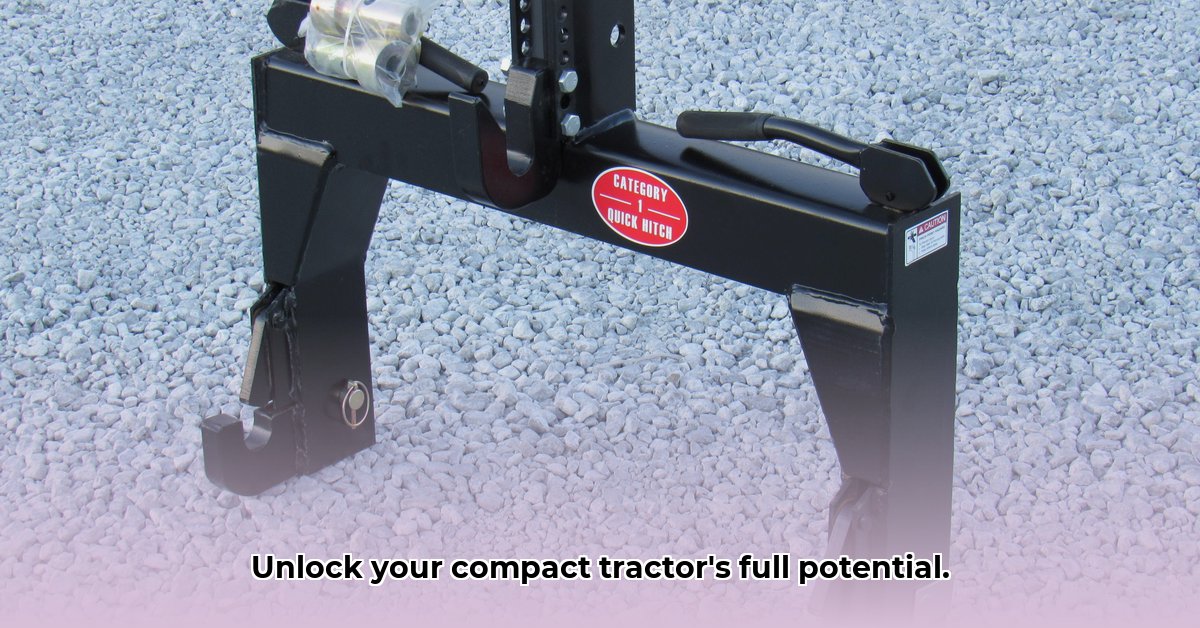
Understanding 3-Point Attachments and Your Tractor
Three-point attachments are implements designed to connect to the rear of compact tractors via a three-point hitch system. This system allows for quick and easy attachment and detachment of various tools, transforming your compact tractor into a versatile machine for tasks ranging from land clearing to gardening. This guide is designed for homeowners and small farmers seeking to enhance their tractor's functionality. Before selecting attachments, consult your tractor's owner's manual to determine its capabilities. Crucially, note the Power Take-Off (PTO) horsepower rating—this dictates which attachments your tractor can safely and efficiently operate. For more information on tractor implements, see this helpful resource.
Choosing the Right Attachment: A Detailed Comparison
The selection of the correct 3-point attachment hinges on your specific needs and tractor capacity. The following table provides a comparison of common attachment types, highlighting key specifications to guide your decision-making process. Remember, these are typical ranges; always refer to the manufacturer's specifications for precise details. Do your tractor and intended tasks match the attachment's requirements?
| Attachment Type | Primary Function | Typical PTO HP Needed | Typical Working Width (ft) | Typical Weight (lbs) | Key Considerations |
|---|---|---|---|---|---|
| Rotary Cutter | Cuts tall grass, weeds, and small brush | 15-30 HP | 4-7 | 400-800 | Ideal for maintaining fields and clearing overgrown areas; blade sharpness crucial. |
| Box Blade | Levels and smooths ground, moves earth | 10-25 HP | 4-6 | 300-600 | Excellent for creating smooth surfaces and grading; adjustable angle is beneficial. |
| Tiller | Prepares soil for planting | 10-20 HP | 4-6 | 200-500 | Essential for gardening and small-scale farming; choose depth based on soil type. |
| Post Hole Digger | Digs holes for posts and other applications | 15-30 HP | Varies (auger dependent) | Varies | Auger size is crucial; ensure compatibility with your tractor's PTO and lifting capacity. |
| Landscape Rake | Smooths and grades, gathers debris | 10-20 HP | 4-6 | 200-400 | Useful for cleanup after grading or land clearing. |
Detailed Instructions for Specific Attachments
Rotary Cutter: Attachment, Operation, and Maintenance
Attachment: Raise the tractor's three-point hitch. Align the rotary cutter's pins with the hitch's lower links and secure them with cotter pins. Lower the cutter to the ground.
Operation: Engage the PTO slowly. Start at a low ground speed, gradually increasing as needed. Overlap passes for even cutting.
Maintenance: Regularly inspect blades for wear and tear. Sharpen or replace dull blades to maintain cutting efficiency. Lubricate moving parts as needed.
Box Blade: Attachment, Operation, and Maintenance
Attachment: Secure the box blade to the three-point hitch, ensuring all pins and clips are firmly in place.
Operation: Adjust the scraper blades to control depth and angle. Begin with shallow passes, gradually increasing depth as needed. Overlap passes for even grading.
Maintenance: Lubricate moving parts regularly and inspect for damage after each use. Address any issues promptly.
Troubleshooting Common Problems
Many problems stem from incorrect attachment or exceeding your tractor's capabilities. Verify that the attachment is correctly hitched and your tractor's PTO horsepower is sufficient. Incorrectly sized or damaged components are also common causes of malfunctions. Consult the manufacturer’s troubleshooting guide for specific solutions. If the problem persists, seek professional assistance.
Conclusion: Maximizing Your Compact Tractor's Potential
Selecting the appropriate 3-point attachments significantly enhances your compact tractor's versatility and productivity. By carefully considering your specific needs, tractor capabilities, and the factors outlined in this guide, you can optimize your equipment for years to come – efficiently and safely completing your projects. Remember to always prioritize safety and maintain your equipment regularly. Consult manufacturer websites and resources for additional information specific to your models.